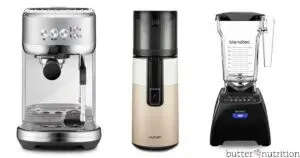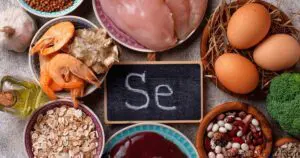 Are you getting enough protein? There is a good chance that you are not! Here’s 11 ways that your body can hint that you just aren’t getting enough protein:
Are you getting enough protein? There is a good chance that you are not! Here’s 11 ways that your body can hint that you just aren’t getting enough protein:
- Fatigue
- Low thyroid function
- Poor detoxification
- Digestive difficulties
- Poor hair and nail growth
- Estrogen dominance
- PMS
- Cravings (especially for proteins like red meat!)
- Blood sugar instability
- Poor sleep
- Weight gain
If this is you, here are some simple tips to discover how much protein you need, and how to balance your protein intake accordingly.
Roughly 15-20% of your daily calories should come from protein, that's roughly 75-100 grams daily based on a diet of about 2,000 calories/day. Of course, these needs can change with activity level, pregnancy, illness, and other circumstances (so always listen to your body). Although I'm not one to recommend counting grams or calories, sometimes it is helpful for a day or two to make sure you are eating enough.
How to determine how much you need: You should plan on getting around .6 to .75 grams of protein each day per pound of body weight. Here's a little equation if you need more help: body weight x .6 (or .75) = ballpark grams of protein per day. The more active you are, the more you need.
For example, if you weigh:
125 pounds: 75-94 grams/daily
150 pounds: 90-113 grams/daily
175 pounds: 105-131 grams/daily
200 pounds: 120-150 grams/daily
For example, if you need about:
1800 calories/day: 67.5-90 grams/daily
2000 calories/day: 75-100 grams/daily
2200 calories/day: 82.5-110 grams/daily
2400 calories+/day: 110+ grams/daily
Protein balance to reflect eating the "WHOLE" animal
Your body needs a certain balance of amino acids (building blocks of protein) to support your bodily functions, particularly your liver and detoxification. The very balance you need is achieved when you eat the "whole animal" and ALL of its parts. When you just eat "muscle meats" regularly, (chicken, pork, beef, lamb, etc.), you tend to create an amino acid imbalance in your body that favors inflammation and starves your liver! It is important to balance the amino acid profiles you put in your body.
- Proteins to consider increasing in the diet: Gelatin, bone broth, and low-mercury seafood
If you have been eating a Standard American diet, it would greatly benefit you to to try and eat for a more balanced protein consumption.
How much protein do you eat per day? Are you getting enough?
PIN IT:
Sources:
Ray Peat, PhD
Metabolic Blueprint






melanie
What about the skin of these meats? I'm assuming it would be inflammatory since it's so fatty?
Nahla
I'm Egyptian and we regularly eat animal organs such as liver, kidneys, heart, brain, even tongue. They r sometimes speciality plates, especially liver, when cooked well. It's as expensive here as muscle meat.
Mel
What about vegetarians? What would be antii inflammatory protein besides eggs/dairy??
Dee
Tofu, black beans, seitan, lentils, almonds, cashews, quinoa, tempeh, peanut butter are some
Lily
Actually Ray Peat and Matt Stone told in their articles that dairy and eggs are high in methionine and low in glycine... Why so much hate against plant proteins ? A lot of people thrive on vegan diet for years and years ! You wasn't abble to stay vegan but don't induce people to eat so mucg meat !
Sonia
I am trying to follow a vegan diet so what should I eat more for protein? I eat seeds, nuts,beans not much tofu though! Sonia
Jessica K
It is funny to me how misleading this article is. Firstly, the Reccomended Dietary Allowance of protein presented here is .6-.75 grams per pound of body weight. However according to the World Health Organization and Harvard Health studies, it is actually 0.8 grams per KILOGRAM of body weight, and so 0.36 grand per POUND of body weight. To reach your RDA of protein, you may need as little as 10% of your calories to come from protein! Secondly, there has never been a documented case of protein deficiency in ANYONE who is eating sufficient calories, therefore the only way you can be deficient in protein is if you are starving yourself. Thirdly, as many others have stated, there is no mention of plant-based proteins, only animals, which can be very problematic due to their cholesterol, saturated fat, cancer-promoting properties, and possible hormones/steroids. America is the country that eats the most protein in the world, yet look at the state of the general populations health due to a mainly animal-based diet. Lastly, putting eggs and dairy under the “anti-inflammatory” category is absolutely ridiculous as they are known to cause inflammation in the body, regardless of whether or not one is lactose intolerant or allergic to either. They can cause such things as acne and an irritated digestive system, not to mention the over 30+ bovine hormones present in milk. More plant-based sources need to be promoted for us to look great inside and out!
ROSIE
There are as you know many protein drinks out there. We have tried over 12 different companies over the years just to find ingredients that weren't good. Do you ever recommend a protein drink?
we do not have the time to always eat things that we should especially proteins.
Love your info and the site. You know things many do not recognize. I like Ray Peat"s info.
Thank you for your time